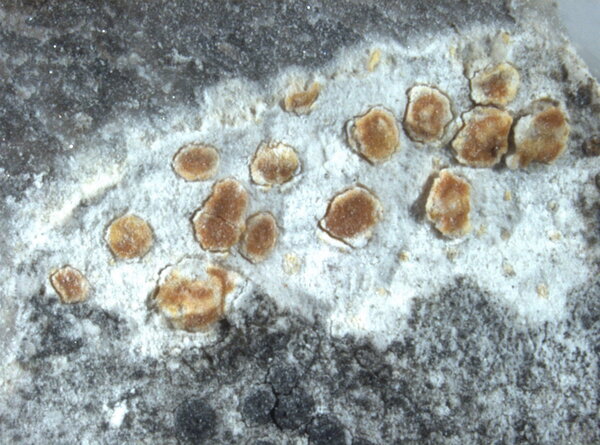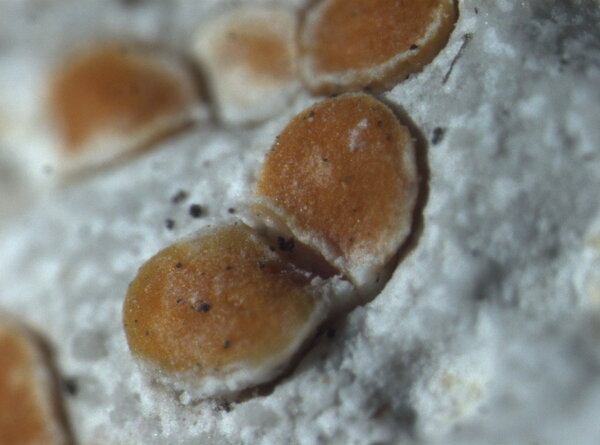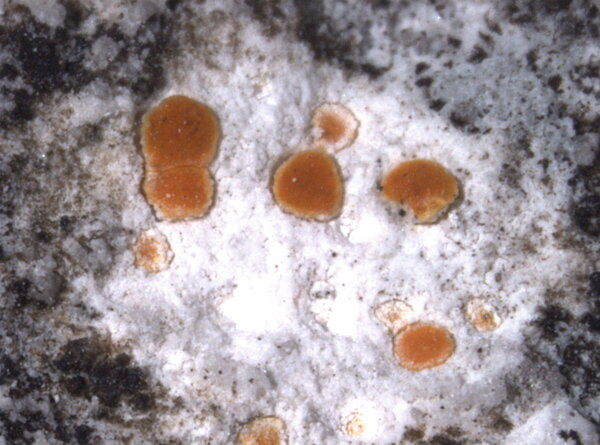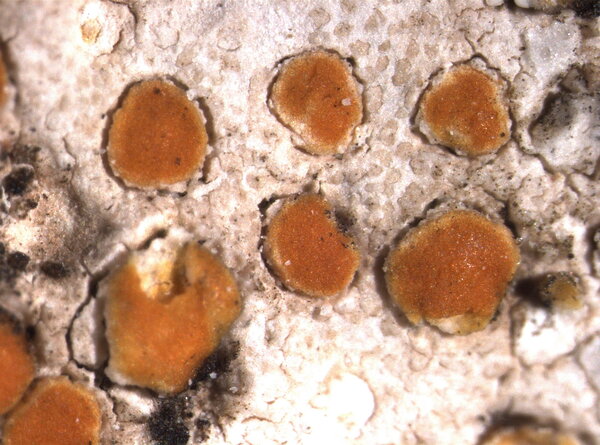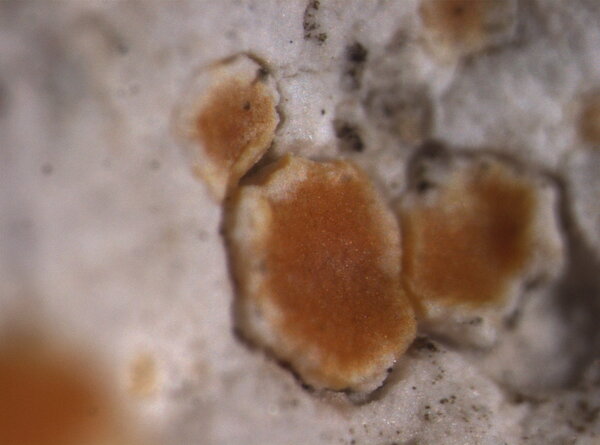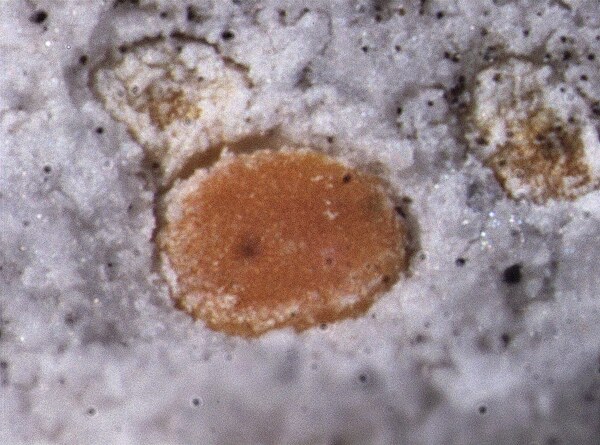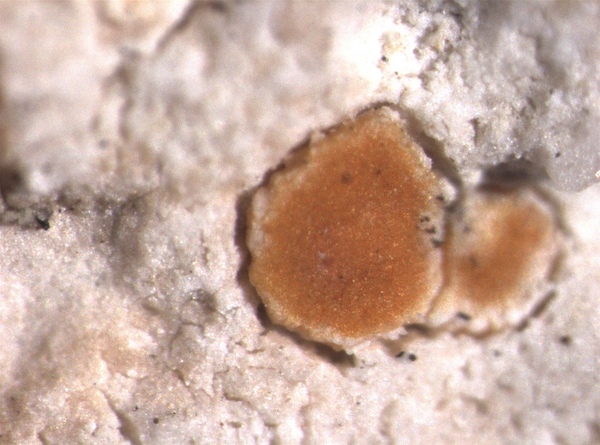Protoblastenia szaferi J. Nowak
Fragm. Flor. Geobot. (Kraków), 20, 4: 529, 1974.
Synonyms:
Distribution: N - Frl (Nascimbene & al. 2021).
Description: Thallus crustose, endosubstratic, forming 1-2(2.5) cm wide, sometimes confluent, well-delimited white patches, without a distinct prothallus. Apothecia bright orange, 0.4-0.8 mm across, immersed in shallow pits in the rock and separated from the rock by a marked cleft, later slightly projecting, with a persistently flat disc and a paler marginal rim. Proper exciple poorly developed, near the hymenium consisting of subparallel hyphae, the intercellular spaces filled with a mixture of anthraquinone and oxalate crystals, the outer rim composed of interwoven hyphae inspersed with oxalate crystals; epithecium orange, with granular crystals reacting K+ purple-red, N-; hymenium colourless but appearing pale orange due to scattered anthraquinone crystals, c. 60-70 μm high; paraphyses shortly septate, sparingly branched and anastomosing, 2.5-3 μm thick, the apical cells hardly swollen; hypothecium colourless, of interwoven hyphae, with scattered clusters of oxalate crystals. Asci 8-spored, clavate, with a well-developed, amyloid tholus containing a more intensely amyloid, indistinct tube structure, without an ocular chamber, approximating the Porpidia- or Psora-types. Ascospores 1-celled, ellipsoid to subglobose, (9-)10.5-12(-15) x 5-7 μm, without a distinct perispore. Photobiont chlorococcoid. Spot tests: thallus K-, C-, KC-, P-; apothecia K+ red. Chemistry: thallus without lichen substances; apothecia with anthraquinones.Note: on north-exposed, steep rock faces, from the treeline ecotone to the alpine belt; known from the Tatra mountains, Scandinavia and the Alps, and there so far only recorded from the Eastern Alps (Austria, Germany, Italy), but likely to have been overlooked elsewhere. For further details see Hafellner (2006b).
Growth form: Crustose
Substrata: rocks
Photobiont: green algae other than Trentepohlia
Reproductive strategy: mainly sexual
Commonnes-rarity: (info)
Alpine belt: very rare
Subalpine belt: very rare
Oromediterranean belt: absent
Montane belt: absent
Submediterranean belt: absent
Padanian area: absent
Humid submediterranean belt: absent
Humid mediterranean belt: absent
Dry mediterranean belt: absent

Predictive model
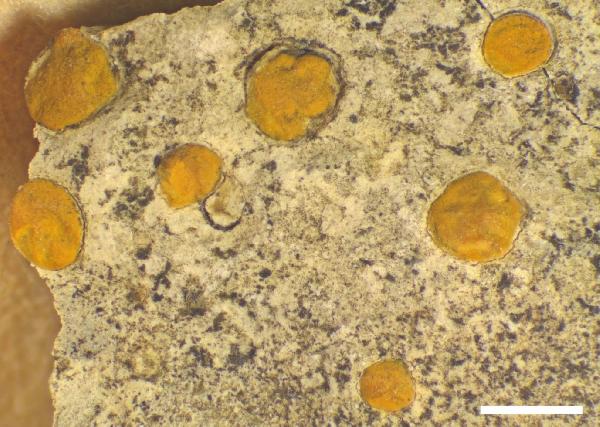
Source: Svensson, M., Ekman, S., Arup, U., Eide Ekman, L., Hammarström, O., Isaksson, R., Jonsson, F., Palice, Z., Vicente, R. & Westberg, M. 2024. Further additions to the Swedish flora of lichenised fungi. Graphis Scripta 36 (2): 15–49. Oslo. ISSN 2002-4495. - CC BY-4.0
vividly orange apothecia surrounded by a distinct crack (UPS L-
784109). Bar = 1 mm
Growth form: Crustose
Substrata: rocks
Photobiont: green algae other than Trentepohlia
Reproductive strategy: mainly sexual
Commonnes-rarity: (info)
Alpine belt: very rare
Subalpine belt: very rare
Oromediterranean belt: absent
Montane belt: absent
Submediterranean belt: absent
Padanian area: absent
Humid submediterranean belt: absent
Humid mediterranean belt: absent
Dry mediterranean belt: absent

Predictive model

 INDEX FUNGORUM
INDEX FUNGORUM
 GBIF
GBIF
 DOLICHENS
DOLICHENS
